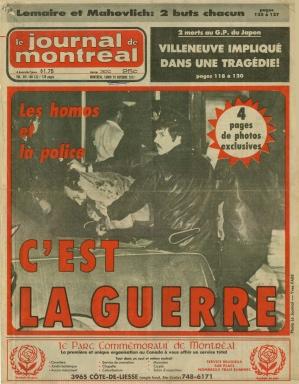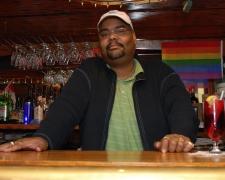
THIS IS WAR. The Oct 21, 1977 police raid on gay bars on Stanley, including Le Mystique and Truxx, was a catalyst that brought Montreal's gay community together. The Oct 24, 1977 cover of the Journal de Montreal is shown above. Credit: image courtesy of the Quebec Gay Archives
After 37 years, Montreal’s oldest gay bar will be closing its doors for the final time. Though the bar, and its upstairs neighbour, the Stanley Pub, have been up for sale for over a year, Mystique manager Steven Wells confirms a deal is close to being finalized and that the new owners have “no plans to keep Le Mystique open.”
And for many who know Le Mystique’s place in Montreal’s queer history, this is indeed sad news. “Obviously, we are greatly saddened by this,” says Wells, “and not just for staff. Many of our regulars are disheartened to know the place won’t be around.”
Le Mystique is the last gay outpost west of Montreal’s east-end gay Village, situated on Stanley Street in a discreet spot halfway between McGill campus and Concordia’s downtown campus. Though there were recent efforts to get more students in to drum up more business, Wells concedes these are tough times for gay drinking holes. “A lot of younger people meet online now. Since Mystique’s heyday in the ’70s, we’ve had the AIDS crisis, which took a lot of patrons, we’ve had the Village move east, and we’ve had the smoking ban. These things haven’t helped us. In May, Loto-Quebec also took out our three lotto machines, and that’s hurt us too.”
Despite its rather drab décor — it seems like a very run-of-the-mill basement pub — Quebec’s gay historians say Mystique is hallowed ground, a crucial spot in the city’s queer evolution. Ross Higgins, co-founder of the Quebec Gay Archives, points to Mystique’s spot in a key moment of social change for Montreal’s queer citizens. In the wee hours of Oct 21, 1977, police raided several of the gay bars on Stanley, including Truxx and Le Mystique. The police used ludicrously heavy-handed tactics, arriving with guns drawn, arresting 146 gay men on spurious charges. It is now thought that, beyond homophobia (which obviously played a part), it was part of the municipal government’s plan to continue to harass the city’s gay milieu and the businesses that served them, effectively pushing them away from the downtown core and further east. Since most of the arrests happened at Truxx, the night has since become known as the Truxx Raids.
The police action prompted a potent counter-reaction, however. It inadvertently helped to galvanize the gay community. Gay men who previously had felt no political connection to being gay began speaking out and protesting. By the very next night, over 2,000 gay men and allies blocked the corner of Ste-Catherine and Stanley, effectively paralyzing the downtown core. This drew huge amounts of media attention and put the issues of human rights front and centre. Many said they felt that a majority of straight people supported their cause, and that enough was enough in terms of police harassment.
By the following December, the effects could be felt. Quebec’s national assembly, then in the hands of the PQ, approved Bill 88, which added sexual orientation to Quebec’s charter of human rights as an illegal basis for discrimination. This made Quebec the first place in North America to have such protection (and it would be quite some time before another province would follow suit). It also led to one of Montreal’s first Pride Parades, in 1979.
Since its glory days, Le Mystique has gotten occasional notices in the press, not all of them welcome. Some patrons expressed their dissatisfaction after reading a 1996 Montreal Mirror cover story on Montreal’s “strangest bars.” Le Mystique was listed, and was likened to the scene captured in William Friedkin’s landmark 1970 film The Boys in the Band, which depicted a group of pre-Stonewall gay men who were unhappy, self-hating and often addicted. Not such a flattering analogy, the regulars said at the time.
Wells says it’s too bad this historic spot could no longer make a go of it. “Right now we’re just waiting to find out precisely what the timeline is for closing the doors. We just hope they give us enough notice that we can have a big closing party. Our patrons deserve that. And so does the spirit of Le Mystique. There’s something really incredible about having a drink with friends in a bar that’s a piece of history.”
Le Mystique’s farewell bash — all are welcome! — will happen on Sat, Sep 26. Fun starts at 7pm. Come and celebrate a crucial piece of Montreal’s queer history.

 Why you can trust Xtra
Why you can trust Xtra


